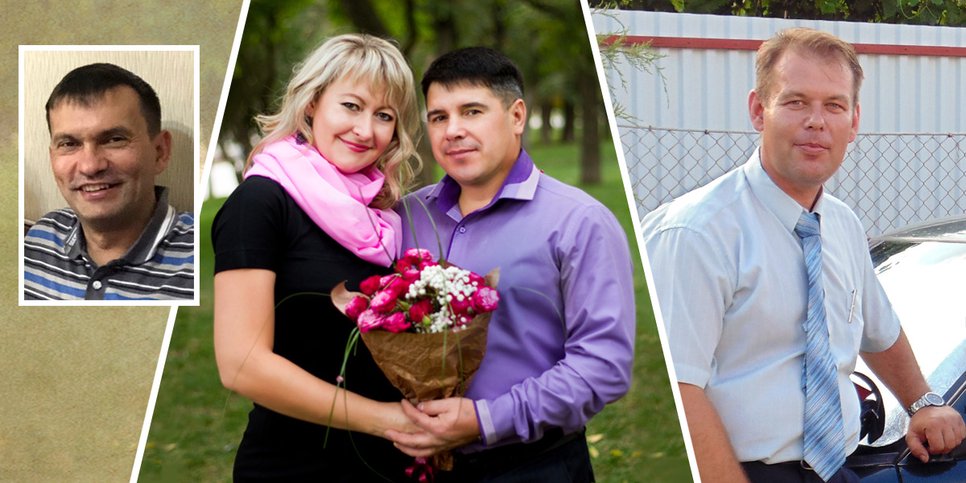From left to right: Rustam Diarov, Evgeny and Olga Ivanov, Sergey Klikunov
From left to right: Rustam Diarov, Evgeny and Olga Ivanov, Sergey Klikunov
Unprecedented Verdict in Astrakhan: Three Jehovah's Witnesses Got 8 Years Each, One More Believer - 3.5 years in prison
Astrakhan RegionOn October 25, 2021, the Trusovsky District Court of Astrakhan sentenced Rustam Diarov, Sergey Klikunov and Yevgeniy Ivanov to 8 years, and Yevgeny's wife, Olga, to 3.5 years in prison. These are the longest sentences that Russian courts have imposed on Jehovah's Witnesses for their religious beliefs in recent years.
“Eight years - in Russia, a criminal can get even less sentence for murder or rape. Officials called upon to ensure justice put harmless talk about the Bible on a par with horrible crimes,— said Yaroslav Sivulskiy, a spokesman for the European Association of Jehovah's Witnesses.— Earlier, only one believer, Aleksey Berchuk,, was sentenced to 8 years in prison for his faith. If we talk about sentences to women, then the current verdict against Olga Ivanova is a record one. Before her, only 70-year-old Valentina Baranovskaya, who barely survived these events, was sent to prison under such an article”.
Believers in Astrakhan insist on their complete innocence. The verdict has not entered into force and can be appealed in the appellate instance. If protection cannot be achieved in Russia, lawsuits to international structures are possible.
Yevgeniy Ivanov, a shipbuilder by profession, and his wife Olga, a linguist, were deprived of the opportunity to provide for themselves and take care of their elderly mothers due to criminal prosecution for their faith. Olga's mother recently lost her husband. She underwent two operations and needed medical attention, but her daughter was under house arrest and therefore could not help her receive qualified medical care. The criminal prosecution of the welder Sergey Klikunov deprived his wife and daughter of their only breadwinner. Rustam, a puppet theater actor, also lost his favorite job due to his arrest.
Yevgeniy Ivanov, Rustam Diarov and Sergey Klikunov spent more than 500 days in a pre-trial detention center, while Olga Ivanova was under house arrest. She says: “Your apartment becomes a 'camera' with more comfortable conditions ... without the right to leave the house without the permission of the investigator or the court. To control my movements, an electronic bracelet was put on me. For the first two months, I was generally forbidden to leave my apartment. At the same time, I was not allowed to use the telephone, except for calling emergency services. A ban was imposed on the use of the Internet, as well as receiving and sending letters by mail. For the next 8 months I was allowed two-hour walks, but only in the courtyard of my house and at a strictly defined time. " With the permission of the investigator, her mother moved to Olga from another city. “It was a huge support for me,” Olga continues. “Friends helped my mother buy groceries. To transfer the necessary things for Yevgeniy to the pre-trial detention center, they arrived early in the morning and stood in line even before it opened. "
On June 9, 2020, mass searches took place in at least 27 families of local believers. More than a hundred of law enforcement officials of the Investigative Directorate of the Investigative Committee of the Russian Federation for the Astrakhan Region and regional FSB and Ministry of Internal Affairs took part in the raid. A day earlier, Nikolay Banko, an investigator of the Investigative Directorate of the Investigative Committee of the Russian Federation for the Astrakhan Region, opened a criminal case against Sergey Klikunov, Rustam Diarov, Yevgeniy and Olga Ivanova. On May 31, 2021, the case was transferred to the Trusovskiy District Court of Astrakhan.
Although there is not a single victim in the case, the prosecutor asked the court to appoint the believers from 4 to 8.5 years in prison. In passing the verdict, Judge Aleksey Semin changed these terms slightly.
Jehovah's Witnesses around the world are renowned for their peaceful worship practices. Believers in Astrakhan also gathered to pray and discuss the Bible with fellow believers, but the authorities groundlessly considered this a threat to the security of society and the state.
Human rights activists of the Sova Information and Analytical Center state: “We believe that this decision [of the Supreme Court of the Russian Federation of April 20, 2017], which entailed mass persecution of believers under anti-extremist articles of the Criminal Code, had no legal basis, and we regard it as a manifestation of religious discrimination ".



